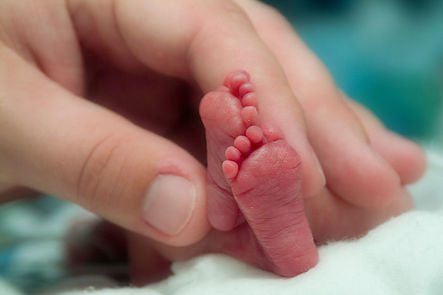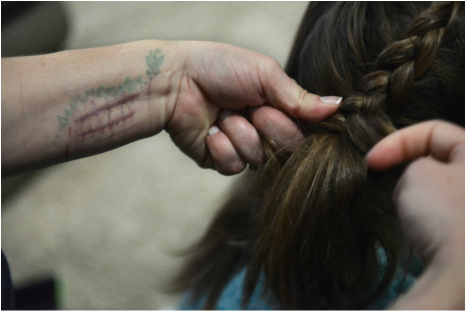
|
In this poignant short video by Swedish filmmaker Erik Rosenlund, we get a unique glimpse into the reality of living with ADHD from a child's perspective. The beautiful film demonstrates many of the struggles these children face including difficulties in the classroom to their social relationships and how they may be seen by other youth. The film which aims to promote greater understanding of youth living with ADHD, also movingly demonstrates the importance of having a supportive parent who provides both love and patience.  Though they met by chance one morning while out for a walk, photographer Matthew Busch quickly learned that Angela Klein was not just a busy wife and mother of four children, but she was also learning to accept her new diagnosis of Borderline Personality Disorder, which had begun to explain her feelings of anxiety, depression, and self-injury that had persisted for most of her life. Through their initial connection and Klein's openness about her diagnosis and daily struggles, she let Busch into her home over the course of a year to document through photographs her story and journey with BPD, as well as to demonstrate the impact on her family and their unconditional love and support for her. Through the photographs both Klein and Busch hope to combat the stigma around mental illness, increases support and treatment services for those with personality disorders, and provide a sense of hope for others who are sharing a similar experience. As Busch wrote on his website, "Angela’s story is one common to many Americans, and an example of how fragile anyone’s world can become when stricken by mental illness." "While borderline personality disorder is still a daily struggle for Klein, her emotional range also helps her to empathize and connect with others. During a drive with Busch in the car, Klein was moved to tears after hearing an emotional story on the radio about human trafficking. 'Angela doesn't let go of her empathy when she hears about the struggles of others; she connects to it and to them,' Busch said. 'Her emotional range can go from self-destructive to engaging and compassionate.'" To see the full collection of photos, follow the link below: http://matthewbuschphoto.photoshelter.com/…/C0000eTmkweANeTA For more about this story, visit: http://www.cnn.com/…/cnnphotos-angelas-beautiful…/index.html
#Anorexia #nervosa and #bulimia #nervosa are two of the most well-known eating disorders to the general public. However, there are various other conditions of disordered eating that are less known, but deserve to be understood and cared for just as much. It's important to remember that often patients do not strictly fall into one category of disordered eating, but can experience a combination effect of symptoms, behaviours, and thought-distortions associated with multiple different #eating #disorders.
http://www.independent.co.uk/…/eating-disorder-awareness-we… One Word: You Don't Look Like... (Eating Disorders) #Eating #disorders have the highest mortality rate among all #mental #illnesses, and #recovery is a lifelong journey. It is important to do our best in helping those who are on the road to #recovery in any way we can - and this can begin with the words we use in conversation. Become more aware of triggering or harmful statements/phrases by reading here:
http://elitedaily.com/life/things-never-say-eating-disorder/1345092/ After the Supreme Court of Canada struck down the ban on physician-assisted death (PAD), there has been emerging interest in and discussion of some individuals with mental illness, such as depression, accessing assisted suicide. While we are still waiting on more specific legislation that will further outline who will be able to access PAD and how, at present individuals who are considered candidates must be those with "grievous and irremediable medical condition that causes intolerable suffering", which some worry may include those with severe forms of mental health issues. Other experts advocate for such mental health patients and their right to access PAD, explaining that some patients have treatment-resistant forms of mental illness and continue to endure great suffering despite trying various treatment modalities. In addition, it is also noted that other countries who have legalized PAD, such as Belgium, do allow individuals with mental health issues to access assisted suicide and have encountered no issues of misuse. "Schuklenk [a Queen's University professor of philosophy and the Ontario Research Chair in Bioethics] notes that more than 40 per cent of persons living with depression do not respond to treatment; at least, not for an extended period of time. And for those living with "treatment-resistant depression," the pain is as real as any other debilitating illness. "It's very difficult for people to intuitively understand what suffering is involved in something that is not 'quote unquote' physiological. But the truth is, of course, anything that's happening in our bodies is physiological," Schuklenk said." For the full article, click here: http://www.cbc.ca/news/canada/manitoba/winnipegger-seeks-physician-assisted-death-for-depression-1.3424388  From noise-cancelling headphones for exams to tea time to mindful meditation to therapy dogs, reptiles and even kangaroos and skunks, universities across Canada are working hard to combat stress on campus and prevent mental health issues like #anxiety and #depression. As some colleges and universities in the GTA have noted, "the mind can’t learn if the heart is troubled", and so many faculty are now seeing it as their job to not only teach students english and organic chemistry, but to coach them on developing vital emotional skills that foster #resiliency and greater mental well-being. “"Stress is being exacerbated by the fierce competition for university and jobs, but technology has had an effect too,” said Rhodes scholar Kaleem Hawa, 21 of Trinity College. “We need a replacement for being on the computer because we’re making more friends, but they’re shallower. And we’re more isolated than we’ve ever been.” But in many ways, student stress is a reflection of a larger, distracted, over-stimulated society, says Victoria College’s Kelley Castle, “so we’re trying to calm the culture and create a place where people talk face-to-face, a climate of conversation,” she said. “It’s like emotional CPR.”" For the full story, click here: http://www.thestar.com/yourtoronto/education/2016/01/16/campuses-get-creative-in-battling-soaring-student-stress.html  When we hear the term antepartum or postpartum depression, majority of us think about women, specifically expectant or new mothers. Even from the physician's perspective, one of the "B's" we screen for in the first postpartum visit for women are the "baby blues" and signs of mood disturbances. But what about all the dads out there? New research in fact has found that men too can suffer from antepartum and postpartum depression, indicating that physicians should be extending their screening to all the fathers and soon-to-be fathers out there. While we know that depression among moms may impact attachment and subsequent child development, research also suggest that if unrecognized and untreated, depression among fathers can have the same negative impact on the child and family. In order to raise more awareness to this issue and help fathers and families access help in their community the Fathers Mental Health Network, a website linking new dads to screening tools, resources, and treatment programs and services. "One 2010 American study, looking at data involving more than 28,000 men, found 10 per cent of new dads have postpartum depression. And, as a recent Canadian study shows, plenty of fathers experience depression before the baby is born as well. Led by a team from the Research Institute of the McGill University Health Centre, the Quebec-based research found around 13 per cent of expectant dads dealt with symptoms of depression during their partner’s pregnancy... On top of that, experts say men are less likely to talk about their feelings than women, leading to a lack of understanding and awareness about depression in dads. While moms may be more inclined to show their sadness and stress outwardly by crying, dads tend to express it in different ways — often through anger — and may also self-medicate with alcohol, detach from family life and, as in Billy’s case, lash out at their partner." For the full story, click here: http://www.thestar.com/life/health_wellness/2016/01/25/postpartum-depression-affects-one-in-10-fathers.html |
Description
Supporting and enhancing students' and health professionals' knowledge and understanding of mental health and psychiatry
Archives
June 2017
Categories
All
|


 RSS Feed
RSS Feed
